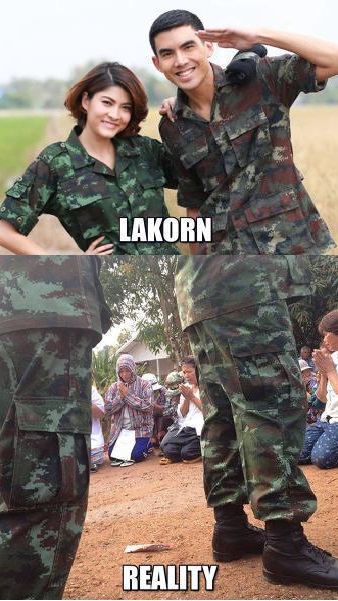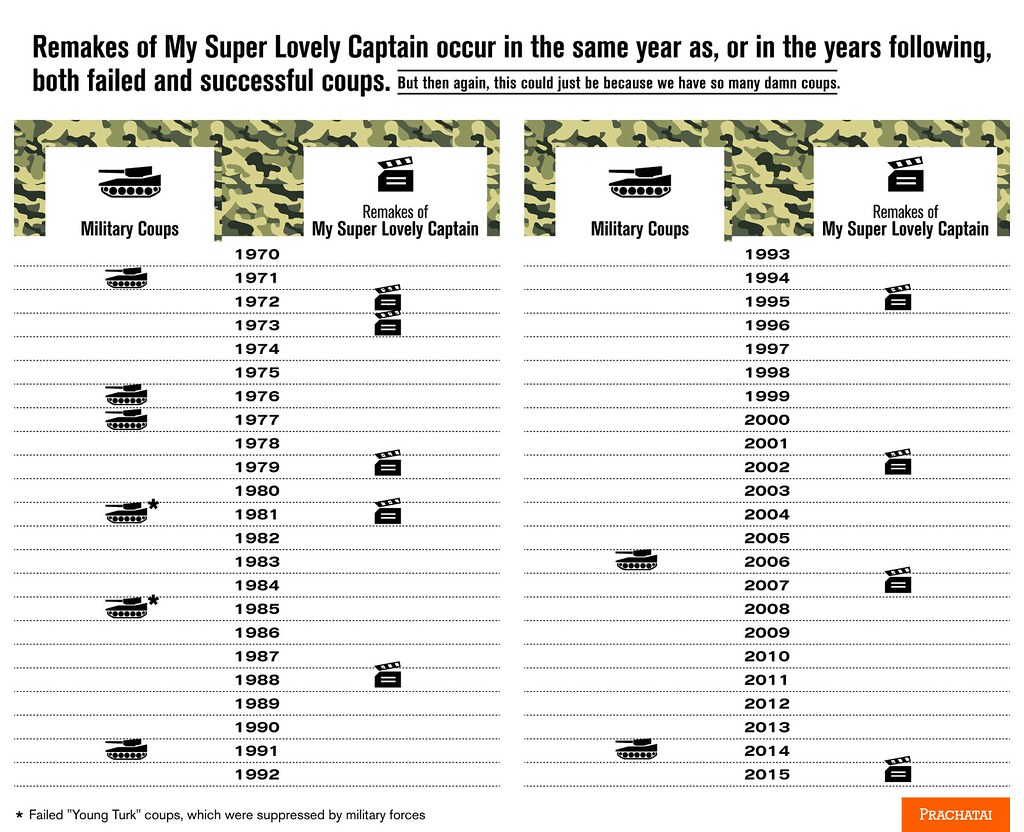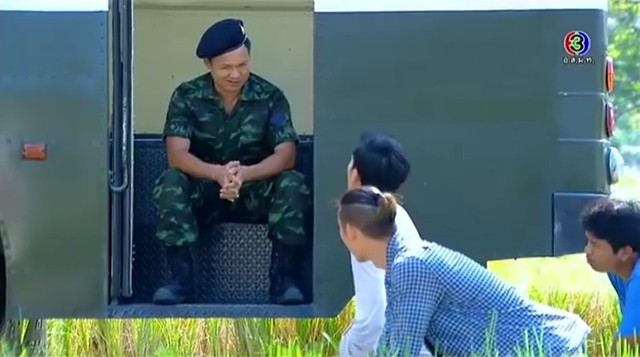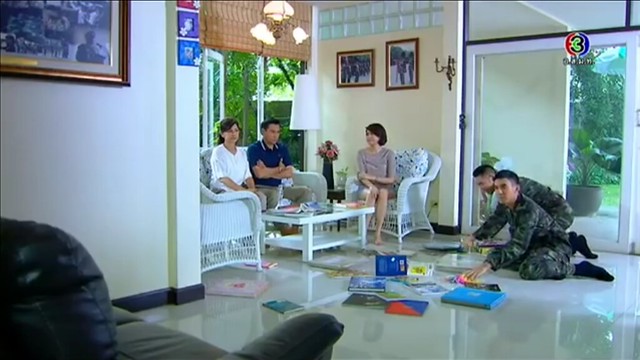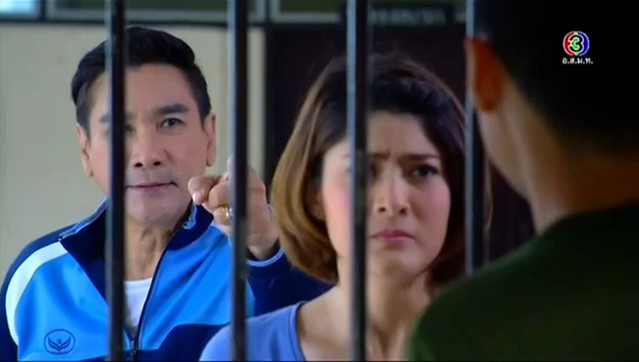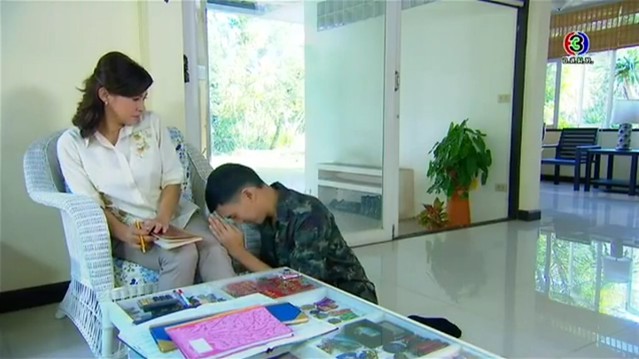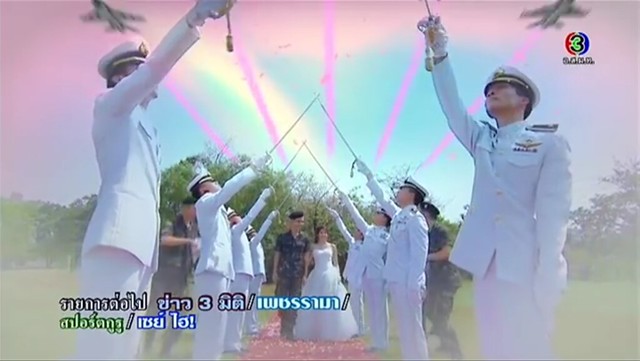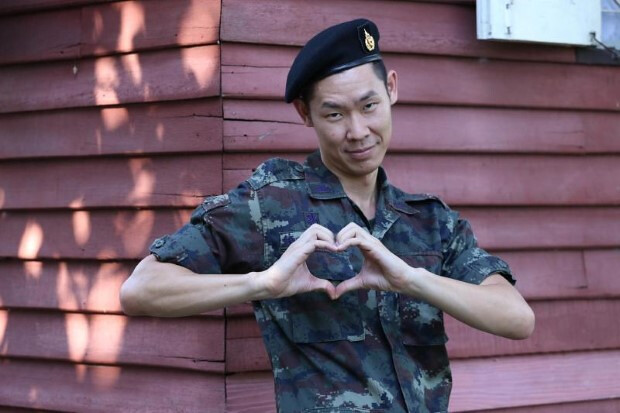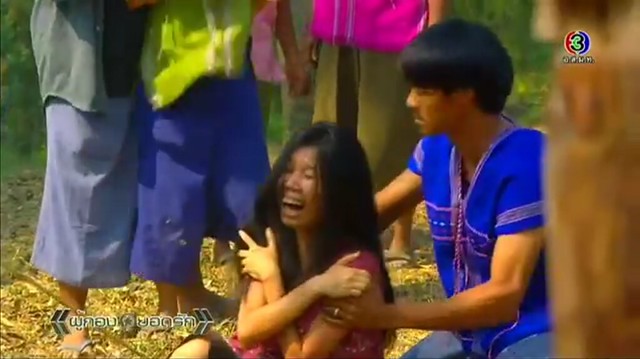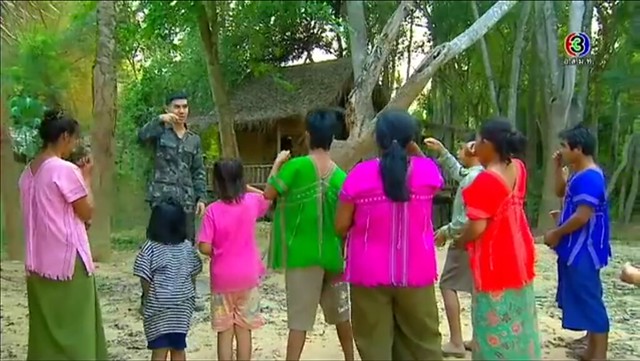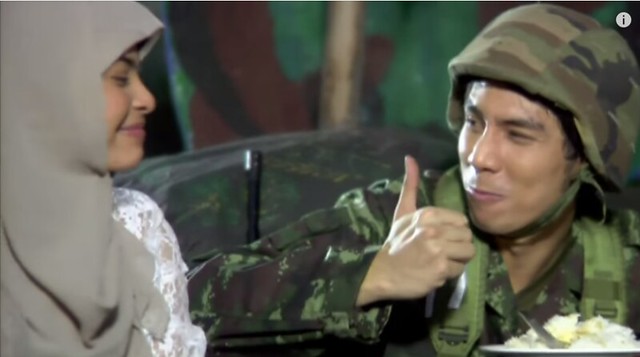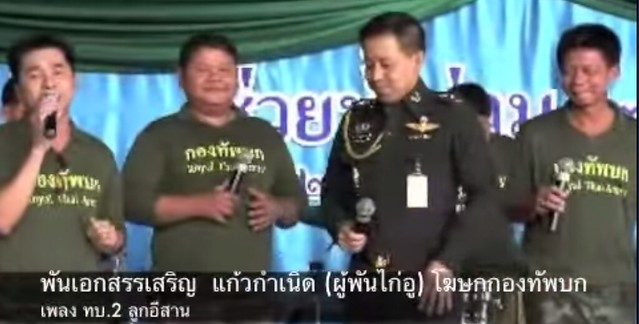Above: A promotional photo of Phu Kong Yod Rak. Below: Soldiers suppress a miners’ protest in Isaan after the 2014 coup.
Since the 70s, Thais have been encountering periodic remakes of a military-themed romantic comedy. Its nine—that’s right, nine—manifestations, released after military coups, show themes of legitimizing and romanticizing the military.
Virtually all Thais have encountered at least one of the nine adaptations of Phu Kong Yod Rak, a romantic comedy novel written by Kanchana Nakanan. Phu Kong Yod Rank, or My Super Lovely Captain, has been made into a movie twice, in 1973 and 1981, and into a soap opera seven times: in 1972, 1979, 1988, 1995, 2002, 2007, and most recently, the currently-running 2015 version, which has just finished its primetime showing on Fridays, Saturdays, and Sundays on Channel 3.
What’s interesting to note is that remakes of My Super Lovely Captain occur in the years immediately following military coups.
Remakes of My Super Lovely Captain occur in the same year as, or in the years following, both failed and successful coups. But then again, this could just be because we have so many damn coups. See larger image
Mandatory post-coup PR
Chanan Yodhong, historian and author of Nai Nai, a book about male consorts in Rama VI’s court, says that Nakanan’s novels such as Phu Kong Yod Rak emphasize the theme of patriotism through rural-urban oppositions as well as across different socioeconomic status.
Each remake of Phu Kong was produced “under different conditions and political contexts, or hidden agendas” says Chanan. For example, the first lakorn version, produced in 1972 and aired on the now non-existent Channel 4 [currently the MCOT channel], was after Field Marshal Thanom Kittikachorn’s 1971 coup. The intention of that version was to preserve his military dictatorship, says Chanan. The 2007 version, aired on the also now non-existent ITV, was after the 2006 coup by Gen Sonthi Boonyaratglin, and made with the same intention, continued the historian. After the 2014 coup by Gen Prayut Chan-o-cha, a 2015 version was made, and is airing on Channel 3, which consistently produces lakorns advocating extreme-right ideals, said Chanan.
“One of those extreme-right ideals is championing the military as an anchor that the nation can depend upon,” says the historian. “In the plot, the soldiers provide medical aid, relieving the aches and pains of the people. They are also sacrificial saviours, using weapons to defeat ‘the Enemy’ for national security.”
The most recent 2015 remake, starring “Ter” Chantavit Dhanasevi and “Margie” Rasri Balenciaga, reinforce how the military—and by extension, the ruling military junta— is intrinsically good-natured, noble, funny, and romantic. The soap reinforces and naturalizes far-right ideals of how military power is not only natural but beneficial to the nation.
The remakes all follow the same plot. Pan Namsuphan, a provincial young man from Suphanburi who speaks with a strong local accent, signs up for the army as a recruit and pursues his commanding medical officer, Captain Chweepong, daughter of the overprotective Lieutenant Colonel. Pan’s strong local dialect makes him seem funny and innocent.
Pan’s choice to sign up for the military, instead of getting conscripted, is emphasized over and over again as a dutiful choice. Pan and the local monk dissuade Pan’s parents, who are upset at his volunteering, by saying that serving the country is the duty of a “true, complete man.”
“The lakorn fails to question the necessity of conscription,” says Chanan.
The lakorn’s idea of being a “true man,” however, is being a servant to commanding officers. The training officer, Sergeant Tong, yells at them to crawl into camp. “It’s your duty to crawl!” Sergeant yells at the Suphan recruits as he rides into the camp on an empty bus.
Pan and his recruit friend cleaning up for the Colonel.
The Colonel and his family have a “servant soldier” to help them out with chores around the house, a role which is filled by Pan. Due to his down-to-earth provinciality, Pan is able to bargain for cheap groceries, massage the legs of the stingy Colonel’s wife, and do various other household chores.
'
The Colonel and the Captain look at Pan behind bars.
The Colonel constantly threatens Pan and his friends with random, unprovoked incarcerations for the rest of the series, naturalizing the military’s strong arm in jailing whomever for whatever. In fact, the term the Colonel and the Major use to threaten Pan is “ขังลืม” (kang luem), literally “jailed and forgotten,” that is, jailed indefinitely without possibility of release. (Unfortunately, this is a common saying in Thai.) In episode 8, the Colonel explicitly suggests kang leum as a way to get rid of Pan that “will not bring trouble to me.”
Pan pays his respects to the Colonel’s wife.
Prachatai’s contact in the military weighs in on Phu Kong’s portrayal of “servant soldiers.” This colonel says that the lakorn was “completely unrealistic” in this regard, because only extremely high-ranking officers could even think of having a servant soldier. There was no way that a colonel, much less a medical officer, would have anyone to drive them around.
“I think the lakorn focuses too much on the recruits being servant soldiers. It reflects badly on the military, since the audience could assume, ‘Wow, that’s what they do with the recruits!’”
He went on to explain that at least 95 per cent of recruits do jobs such as patrolling the borders or guarding outposts, that is, “non-sabai work.” The other five per cent, usually recruits with a degree, are assigned to assist in administrative tasks, such as those that deal with computers, like making Word or PowerPoint documents, and other jobs for commanding officers.
“Of course some soldier assistants have to go to the market to pick up food for the other officers, and any chores done by them is all on royal government grounds. It’s kind of part of the culture.”
“But of course, no recruit has to soak rocks in brine for the commanding officers!” In one episode, Pan does this for the Colonel’s wife. “It’s funny that the lakorn is airing at this point in time. Soldiers in real life would never be sabai like ‘Ter’ [the actor playing Pan].”
Chanan explores the use of servant soldiers, too. The lakorn fails to question whether it is ethical to use servant soldiers outside of work hours on private property, funded by citizens’ taxes, he said.
Pasteurized, romanceable soldiers
“Military lakorns and films in the comedy, war, drama, and royalist genres receive enormous support from the state, and are produced whenever the state feels unstable,” continues Chanan. “Phu Kong Yod Rak pasteurizes the images of the military as tyrannical, backwards, barbaric, uncouth, violent towards citizens, and violators of human rights that have been circulating since the 22 May 2014 coup, presenting instead images of troops as romantic, funny, and lively.”
The historian compares this “pasteurization” by lakorn to Khu Kam, another often-remade drama (12 adaptations in all) that that uses romantic love between a Japanese soldier and a Thai woman during the Greater East Asia War to rewrite history. “New, selective memories from these dramas replace real-life ones about abuse during the Japanese occupation. Brutal violence is replaced with youthful love.”
Chanan says that the use of humour and love, especially in military romantic comedies, humanizes the institution in the eyes of the public. Usually, there is love across ranks, where a recruit falls in love with a higher ranking female officer. “This destroys the image of the military as a regimented, power-based system. Instead, they look like friendly, gentle, nonviolent individuals.”
In the first episode, Pan has a dream sequence about marrying the Captain.
Private Pan has fallen in love with Captain Chaweepong, a pretty medical officer and daughter of the overprotective Colonel. Indeed, the Colonel often warns Pan to be humble and not aspire to love his daughter, since they are from different social ranks.
When the Captain finds out that Pan hid from her his background as an educated law student, he tells a story about putting gold leaf on the back of a Buddha image instead of the front (แปะทองหลังพระ). This is a common Thai idiom, so the fact that Pan literally acted out this idiom is quite an unsubtle message of constructing the ideal citizen under military rules; easy to command, skilled but humble, and entirely unassuming.
One of Pan’s conscript friends, from Post Today.
As for humour, Chanan said that funny moments in the lakorn were also a great, albeit illusory, class-breaking tool, especially when authority figures were being teased or tricked. Our military contact conceded this point. “If officers played pranks on their commanding officers in real life, they would be jailed immediately. It’s a comedic lakorn, so the characters don’t follow any real-life rules.”
The constant joking around by the military characters, while making the military seem friendly and accessible, may produce the unintended consequence of making the military seem silly, as has been expressed in online comments. In order to gauge public opinion on the portrayal of the military in Phu Kong Yod Rak, a forum topic was created on the popular website Pantip. Out of 15 comments, two used the word “retarded” for how they perceived the lakorn’s military.
Five of the comments were defensive and slightly angry for suggesting that we take a lakorn seriously, saying “If it makes you think and stress so much, just go to sleep.” The rest of the comments were divided evenly among relating the broadcast to the junta, the lakorn showing foolish/impossible ideals, and making recruits look bad. Based on this poll we can see that while some Thais refuse to take this lakorn seriously, others are willing to criticize what they are shown on screen.
As far as the lakorn is concerned, soldiers live a fun life in camp, and occasionally venture out to aid citizens.
“Stupid, poor, sick”
“Propaganda often arrives in the form of lakorns and films,” says the historian. “The fun adventures of recruits do not challenge, or even refer to how the military interferes in the public political sphere in real life.”
Chanan elaborates on how such propaganda is completely devoid of soldiers brutalizing political protesters, harassing the families of activists, and other actions to preserve a dictatorship. Instead, troops are seen as giving medical care to remote communities in the countryside, he says.
A possessed hill tribe girl being beaten by a drug-trafficking bandit.
In one episode, the recruits go to “the villages” to dig trenches against flooding for “the villagers.” In another, Private Pan and the Captain arrive just in time to “save” hill tribe villagers from drug-trafficking bandits and malicious, possessing spirits.
Meanwhile, Pan teaches the “barbaric” villagers basic hygiene and common sense through a ridiculous song that includes hand motions. The song, in the tune of the Thai children’s song “Chang,” included “Wash, wash, wash, wash, wash your hands / are your hands clean?” and “Cold, cold, cold, cold, cold, / is your body warm enough?” Prachatai has a hard time believing that hill tribes are children who need a soldier to tell them to put on clothes when the weather is cold.
Pan teaches hill tribes villagers how to use spoons.
Romanticizing the military is a neither new nor rare phenomenon.
Phu Kong Yod Rak is far from being the only form of propaganda romanticizing the military.
Popular songs, strong in the consciousness of many Thais, often romanticize the military. Joe Amarin’s “Goodbye to Maeklong” (ลาสาวแม่กลอง) (2000) and luk-thung singer Yodrak Salakjai’s “New Soldier Joins the Army” (ทหารใหม่ไปกอง ) talk about how a soldier sent far away sacrifices being with his lover to serve the country. The same theme is used in Nhu Meter’s “On the Frontline, Goodbye to Girlfriend,” (แนวหน้าลาแฟน) and the corresponding song, Dao Mayuri’s “Waiting in the Rearguard,” (แนวหลังยังคอย), the titles of which require no further explanation.้
Screenshot from “Northeast Unit 2: Son of Isaan.”
Not only do Thai soldiers feature in songs about leaving their girlfriends behind, they also find new ones while on the job. Pai Pongsatorn’s “2nd Army: Son of Isaan” (ทบ 2 ลูกอีสาน) tells of a soldier from the northeast deployed to the southernmost provinces. “On good, uneventful days the Malay-speaking lady and the Isaan man / smile at each other, sharing kindnesses / We’re from different regions, but we’re all Thai people / After I get released, I’ll call the number you gave me.” Interestingly, this might be a favourite of Col Sansern Kaewkamnerd, currently the NCPO spokesperson, who chose to sing this song in public.
Col Sansern Keawkamnerd singing “2nd Army: Son of Isaan” (ทบ 2 ลูกอีสาน) for recruits during the 2011 flood.
After watching remake after remake of the same plot of lovable soldiers, it’s easy to turn and watch nationalist lakorns rather than reality. Broadcast after broadcast of Phu Kong Yod Rak eventually moulds the primetime slot into hours of nationalistic spectacle.
